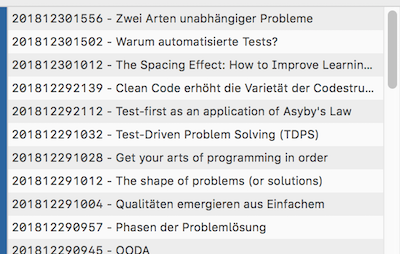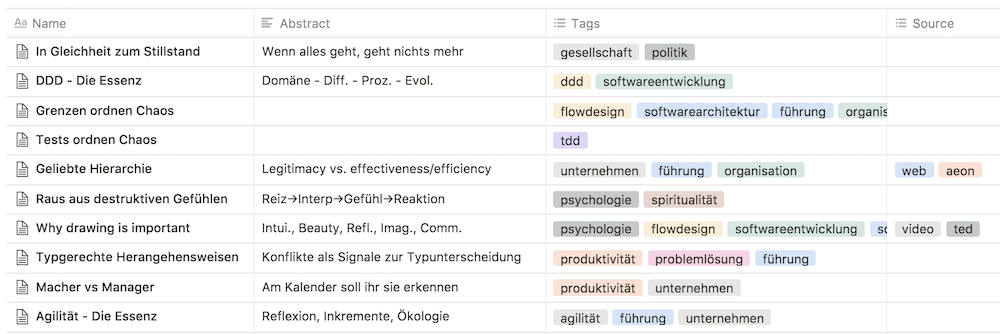Another content level: the abstract
Commonly a zettel gets a title and a body. Both are part of the content. And the title is on a more abstract level than the body.
In a list like this in TA only the title is shown:

What I've found is, that for me it's helpful to insert another level of content between title and body. I call it an abstract.
The abstract is less catchy than the title, and much shorter than the body. That way I enrich my browsing experience with more depth:

I get two handles on a zettel instead of one to jog my memory and stir my imagination.
Or even three levels by including part of the content:

To display more than a simple title in an overview appeals to my visual memory plus my intellect. (Not even mentioning the tags as yet another information dimension.)
Working with zettels which actually look more like a note on a piece of paper makes the content more tangible to me and provides more levels of information:
- Title
- Abstract
- Body
And by thinking about an abstract (usually after I wrote the body) I process the body once more for better mental linking, I'd say.
Howdy, Stranger!
Comments
Is that an Airtable database I see? Do you manually enter your ZK notes in there? How does it serve you?
Why not just make the title a bit longer ?
This is an interesting idea.
@ralfw > The abstract is less catchy than the title and much shorter than the body. That way I enrich my browsing experience with more depth.Not sure about its display in a list. I want a cleaner screen, fewer distractions to get in my way.
But ...
I love this idea of enriching a note. Anything that simulates enriching.
I sense this would be only for longer notes. Maybe on summary/structure notes. But most of my notes I try to keep to the notion of one idea - one note. Maybe my problem is that I'm stuck with small ideas!
One thing that I've always wanted with my notetaking experience is a way to rank my notes on the amount of enrichment in them; linking, tagging, verbiage, other markup, the ratio of self-generated text to quotes, number of times a note was accessed for updating or use.
Will Simpson
My peak cognition is behind me. One day soon, I will read my last book, write my last note, eat my last meal, and kiss my sweetie for the last time.
My Internet Home — My Now Page
@achamess No, that's https://www.notion.so. Airtable allows to define different views on tables but does not support marked-up text well. I would not use it as a knowledge store which is primarily about unstructured data.
@Paul_J_Miller If a zettel does not have more structure than filename + file content as with TA when you have to use the filename. Technically that works - but I find it overloading the filename with purpose: 1. order notes with the timestamp, 2. give notes a title, 3. provide an abstract.
I prefer a tool where a zettel can be more structured.
@Will There just seem to be two different kinds of people or maybe two different views on what "cleaner screen" means. I find a display with adequate and explicit structure cleaner than a list where all meta-data needs to go into a single structural element (e.g. filename). And I find it perfectly "clean" to display more than a title in an overview. But that seems a matter of taste.
An abstract sure is not necessary for every zettel. If the title says it all, if the note is small, then an abstract might not add substantially. But the longer a note the more I find it useful to reflect on it at the end and extract an essence.
To have a metric for "enrichment" sounds interesting. In Coda you could create a property where you can give table entries a star rating. In Notion I'd add a single select property "Enrichments" and maybe create tags like "low", "medium", "high" or the like.
But as long as there are just filename and file content... it's hard to play around with meta-data and more structure for your zettels :-/
Those are not abstracts but rather alternativ titles or a bunch of keywords.
I'd rather recommend to the one senctence abstract I outlined in the book.
I am a Zettler
@Will There are two books on ZK in German:
The latter one is also available in English: How to take smart notes.
The books are looking at the ZK method from different angles. Sascha's Book I found more practical, Sönke's book is more fundamental, more conceptual. Both perspectives are very valuable.